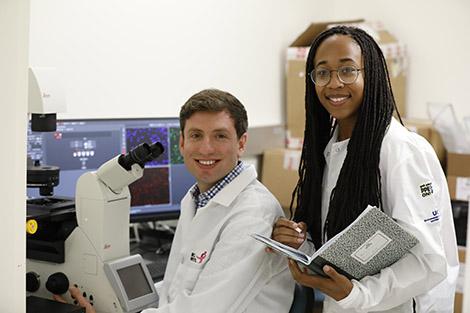
Credit: UCI School of Medicine
Until now, researchers believed recurrent mutations (hotspot mutations) in cancer tumors were the important mutations (driver mutations) that promoted cancer progression. A new University of California, Irvine-led study indicates this is not always true.
Methods for identifying driver genes important to cancer progression have relied on the gold standard of recurrence across patients. Seeing exactly the same DNA base pair mutated repeatedly across many patients has been taken as incontrovertible proof that the mutation must be contributing to tumor development. However, the study, “Passenger hotspot mutations in cancer driven by APOBEC3A and mesoscale genomic features,” published today in Science, reveals many recurrent cancer mutations are likely passenger hotspot mutations and not important for cancer development.
“In our study, we identified that certain recurrent mutations found in DNA stem loops, a common DNA structure, were in fact passenger hotspots and not the drivers we had originally believed them to be.” said Rémi Buisson, PhD, an assistant professor in the Department of Biological Chemistry at the UCI School of Medicine and lead researcher on the study. More importantly, we discovered other recurrent mutations, found in DNA locations outside of stem loops, may be new drivers that are not yet characterized. The importance of our finding is that it gives us the ability to discriminate among mutations, which is essential in order to develop novel cancer therapies.”
Research teams from UCI School of Medicine and Massachusetts General Hospital examined the mutation landscape and the distribution of mutations in the cancer genomes of more than 9,000 patient tumors. They identified that certain hotspot mutations arise from the activity of a family of proteins called APOBEC (apolipoprotein B mRNA editing catalytic polypeptide-like).
“Our analyses show that APOBEC3A, in particular, has a strong preference for DNA structures called stem-loops or DNA hairpins. This preference results in the creation of hotspot mutations in patient tumors,” said Buisson.
Tens of thousands of DNA damage events occur daily in human cells. The APOBEC family of proteins are one of the most common sources of endogenous DNA damage events in cancer cells. APOBEC3A directly attacks genomic DNA, inducing DNA double-strand breaks and mutations. Until now, little was known about how APOBEC3A targets genomic DNA and if some structures of the genome are more prone to APOBEC3A attacks than others. DNA stem-loop structures can be transiently generated during DNA replication, transcription or through diverse DNA repair processes. These multiple pathways provide many opportunities for APOBEC3A to promote structure-specific cytosine deamination favoring the emergence of passenger hotspot mutations in patient tumors.
###
This study was supported by grants from the National Institutes of Health, a National Institutes of Health Pathway to Independence Award, and funding from Massachusetts General Hospital Center for Cancer Research.
About the UCI School of Medicine: Each year, the UCI School of Medicine educates more than 400 medical students, as well as 200 doctoral and master’s students. More than 600 residents and fellows are trained at UC Irvine Medical Center and affiliated institutions. The School of Medicine offers an MD; a dual MD/PhD medical scientist training program; and PhDs and master’s degrees in anatomy and neurobiology, biomedical sciences, genetic counseling, epidemiology, environmental health sciences, pathology, pharmacology, physiology and biophysics, and translational sciences. Medical students also may pursue an MD/MBA, an MD/master’s in public health, or an MD/master’s degree through one of three mission-based programs: the Health Education to Advance Leaders in Integrative Medicine (HEAL-IM), the Leadership Education to Advance Diversity-African, Black and Caribbean (LEAD-ABC), and the Program in Medical Education for the Latino Community (PRIME-LC). The UCI School of Medicine is accredited by the Liaison Committee on Medical Accreditation and ranks among the top 50 nationwide for research. For more information, visit som.uci.edu.
Media Contact
Anne Warde
[email protected]
Original Source
https:/




